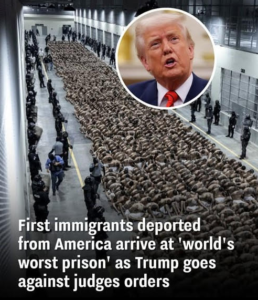In a controversial move, the Trump administration recently deported hundreds of immigrants to El Salvador’s Terrorism Confinement Center (CECOT), widely regarded as one of the world’s most notorious prisons, despite a federal judge’s order to halt such deportations.
Background on the Deportations
The individuals deported were accused of being members of Venezuela’s Tren de Aragua gang, implicated in various criminal activities, including kidnapping and contract killings. Invoking the Alien Enemies Act of 1798, President Trump labeled these immigrants as part of a terrorist organization, thereby justifying their expedited removal. This invocation marked a rare use of the wartime law, raising concerns about executive overreach.
Legal Challenges and Defiance of Court Orders
U.S. District Judge James Boasberg issued a temporary restraining order to block the deportations, questioning the administration’s use of wartime powers for this purpose. Despite this order, deportation flights proceeded. During a court hearing, government lawyers acknowledged that planes carrying the immigrants were already en route to El Salvador and Honduras when the order was issued. Judge Boasberg expressed frustration over the administration’s lack of cooperation and transparency, emphasizing his commitment to uncovering the truth behind these actions.
Conditions at CECOT
The deported individuals were transferred to El Salvador’s CECOT, a maximum-security facility criticized for its harsh conditions. Inmates are confined to their cells for 23.5 hours daily, with limited access to exercise and no provisions for education, recreation, visitation, or phone calls. Meals are basic, and utensils are withheld to prevent potential weaponization. The Salvadoran government has indicated that prisoners at CECOT are unlikely to return to their communities, ruling out rehabilitation programs.
International and Domestic Reactions
The Venezuelan government condemned the deportations, with officials vowing to seek the return of their citizens. Domestically, civil rights groups criticized the administration’s actions, arguing that deporting individuals without due process and to prisons with known human rights abuses violates constitutional protections against cruel and unusual punishment.
Implications for U.S. Governance
This incident has intensified debates over executive authority and adherence to judicial oversight. Legal experts warn that defying court orders sets a dangerous precedent, undermining the checks and balances integral to democratic governance. The situation has prompted discussions about potential constitutional crises and the necessity of safeguarding democratic institutions.
In summary, the Trump administration’s decision to deport immigrants to El Salvador’s CECOT, despite a federal judge’s order, has sparked significant legal and ethical concerns. The use of the Alien Enemies Act in this context, the conditions at the receiving prison, and the apparent defiance of judicial authority collectively raise critical questions about the balance of power and the protection of individual rights within the U.S. legal framework.

